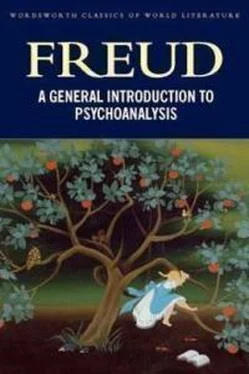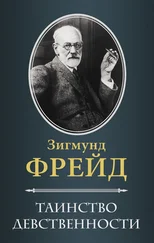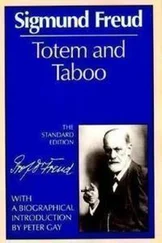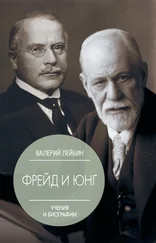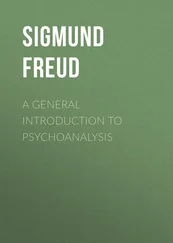The dreams we are looking for are found in children. They are short, clear, coherent, easy to understand, unambiguous, and yet unquestionable dreams. But do not think that all children's dreams are like this. Dream distortion makes its appearance very early in childhood, and dreams of children from five to eight years of age have been recorded that showed all the characteristics of later dreams. But if you will limit yourselves to the age beginning with conscious psychic activity, up to the fourth or fifth year, you will discover a series of dreams that are of a so–called infantile character. In a later period of childhood you will be able to find some dreams of this nature occasionally. Even among adults, dreams that closely resemble the typically infantile ones occur under certain conditions.
From these children's dreams we gain information concerning the nature of dreams with great ease and certainty, and we hope it will prove decisive and of universal application.
1. For the understanding of these dreams we need no analysis, no technical methods. We need not question the child that is giving an account of his dream. But one must add to this a story taken from the life of the child. An experience of the previous day will always explain the dream to us. The dream is a sleep–reaction of psychic life upon these experiences of the day.
We shall now consider a few examples so that we may base our further deductions upon them.
a ). A boy of 22 months is to present a basket of cherries as a birthday gift. He plainly does so very unwillingly, although they promise him that he will get some of them himself. The next morning he relates as his dream, " Hermann eat all cherries ."
b ). A little girl of three and a quarter years makes her first trip across a lake. At the landing she does not want to leave the boat and cries bitterly. The time of the trip seems to her to have passed entirely too rapidly. The next morning she says, " Last night I rode on the lake ." We may add the supplementary fact that this trip lasted longer.
c ). A boy of five and a quarter years is taken on an excursion into the Escherntal near Hallstatt. He had heard that Hallstatt lay at the foot of the Dachstein, and had shown great interest in this mountain. From his home in Aussee there was a beautiful view of the Dachstein, and with a telescope one could discern the Simonyhütte upon it. The child had tried again and again to see it through the telescope, with what result no one knew. He started on the excursion in a joyously expectant mood. Whenever a new mountain came in sight the boy asked, "Is that the Dachstein?" The oftener this question was answered in the negative, the more moody he became; later he became entirely silent and would not take part in a small climb to a waterfall. They thought he was overtired, but the next morning, he said quite happily, " Last night I dreamed that we were in the Simonyhütte ." It was with this expectation, therefore, that he had taken part in the excursion. The only detail he gave was one he had heard before, "you had to climb steps for six hours."
These three dreams will suffice for all the information we desire.
2. We see that children's dreams are not meaningless; they are intelligible, significant, psychic acts . You will recall what I represented to you as the medical opinion concerning the dream, the simile of untrained fingers wandering aimlessly over the keys of the piano. You cannot fail to see how decidedly these dreams of childhood are opposed to this conception. But it would be strange indeed if the child brought forth complete psychic products in sleep, while the adult in the same condition contents himself with spasmodic reactions. Indeed, we have every reason to attribute the more normal and deeper sleep to the child.
3. Dream distortion is lacking in these dreams, therefore they need no interpretation. The manifest and latent dreams are merged. Dream distortion is therefore not inherent in the dream. I may assume that this relieves you of a great burden. But upon closer consideration we shall have to admit of a tiny bit of distortion, a certain differentiation between manifest dream content and latent dream thought, even in these dreams.
4. The child's dream is a reaction to an experience of the day, which has left behind it a regret, a longing or an unfulfilled desire. The dream brings about the direct unconcealed fulfillment of this wish. Now recall our discussions concerning the importance of the role of external or internal bodily stimuli as disturbers of sleep, or as dream producers. We learned definite facts about this, but could only explain a very small number of dreams in this way. In these children's dreams nothing points to the influence of such somatic stimuli; we cannot be mistaken, for the dreams are entirely intelligible and easy to survey. But we need not give up the theory of physical causation entirely on this account. We can only ask why at the outset we forgot that besides the physical stimuli there are also psychic sleep–disturbing stimuli. For we know that it is these stimuli that commonly cause the disturbed sleep of adults by preventing them from producing the ideal condition of sleep, the withdrawal of interest from the world. The dreamer does not wish to interrupt his life, but would rather continue his work with the things that occupy him, and for this reason he does not sleep. The unfulfilled wish, to which he reacts by means of the dream, is the psychic sleep–disturbing stimulus for the child.
5. From this point we easily arrive at an explanation of the function of the dream. The dream, as a reaction to the psychic stimulus, must have the value of a release of this stimulus which results in its elimination and in the continuation of sleep. We do not know how this release is made possible by the dream, but we note that the dream is not a disturber of sleep , as calumny says, but a guardian of sleep, whose duty it is to quell disturbances . It is true, we think we would have slept better if we had not dreamt, but here we are wrong; as a matter of fact, we would not have slept at all without the help of the dream. That we have slept so soundly is due to the dream alone. It could not help disturbing us slightly, just as the night watchman often cannot avoid making a little noise while he drives away the rioters who would awaken us with their noise.
6. One main characteristic of the dream is that a wish is its source, and that the content of the dream is the gratification of this wish. Another equally constant feature is that the dream does not merely express a thought, but also represents the fulfillment of this wish in the form of a hallucinatory experience. " I should like to travel on the lake ," says the wish that excites the dream; the dream itself has as its content " I travel on the lake ." One distinction between the latent and manifest dream, a distortion of the latent dream thought, therefore remains even in the case of these simple children's dreams, namely, the translation of the thought into experience . In the interpretation of the dream it is of utmost importance that this change be traced back. If this should prove to be an extremely common characteristic of the dream, then the above mentioned dream fragment, " I see my brother in a closet " could not be translated, " My brother is close–pressed ," but rather, "I wish that my brother were close–pressed, my brother should be close–pressed ." Of the two universal characteristics of the dream we have cited, the second plainly has greater prospects of unconditional acknowledgment than the first. Only extensive investigation can ascertain that the cause of the dream must always be a wish, and cannot also be an anxiety, a plan or a reproach; but this does not alter the other characteristic, that the dream does not simply reproduce the stimulus but by experiencing it anew, as it were, removes, expells and settles it.
Читать дальше
